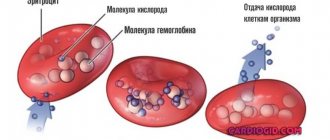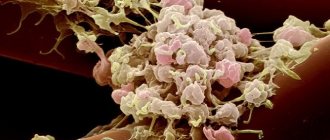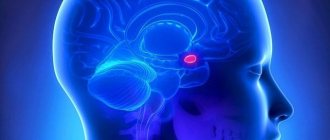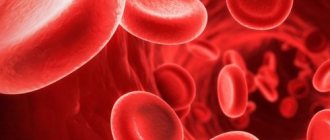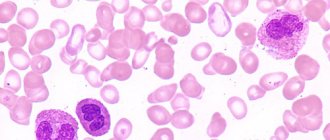19660 06 August
IMPORTANT!
The information in this section cannot be used for self-diagnosis and self-treatment.
In case of pain or other exacerbation of the disease, diagnostic tests should be prescribed only by the attending physician. To make a diagnosis and properly prescribe treatment, you should contact your doctor. We remind you that independent interpretation of the results is unacceptable, the information below is for reference only
T4 free, Free Thyroxine, FT4:
indications for use, rules for preparing for the test, interpretation of the results and normal indicators.
How the body normalizes T4 levels
T4 levels are regulated by two glands: the thyroid gland and the pituitary gland in the brain. The pituitary gland is responsible for the production of thyroid-stimulating hormone (TSH), which controls the level of the thyroid hormone T4. The pituitary gland regulates TSH production according to how much T4 it detects in the blood. For example, if the pituitary gland detects low levels of T4 in the blood, it produces and releases more TSH into the blood. If T4 levels rise, it stops producing TSH. This process ensures that T4 levels remain within normal limits.
What is free T4 (thyroxine) responsible for in the body?
Free or unbound T4 is a fraction of tetraiodothyronine that is not bound to proteins and circulates freely in the blood. Contains no more than 0.03% of total thyroxine. The hormone is synthesized by the thyroid gland under the control of thyroid-stimulating hormone (TSH), which is secreted by the pituitary gland.
Tetraiodothyronine affects the functioning of the entire body. There are no specific target cells for it. It easily overcomes membrane membranes, binding to receptors of different cells. Free T4 performs important functions in the body:
- increases oxygen consumption by tissues;
- increases heat production;
- stimulates the formation of retinol in the liver;
- reduces the level of triglycerides and cholesterol in the blood;
- accelerates protein metabolism;
- stimulates the excretion of calcium through the kidneys;
- activates bone tissue cell renewal;
- stimulates the functioning of certain areas of the brain stem.
The level of unbound T4 adequately reflects the secretory activity of the thyroid gland. In combination with pituitary hormones, it gives insight into the functioning of the endocrine system in patients with altered levels of thyroxine-binding globulin (TBG).
An increased content of tetraiodothyronine is fraught with serious diseases. The cardiovascular, genitourinary, digestive, and hematopoietic systems are primarily affected.
Accelerating catabolism is the main function of T4. It stimulates energy release and heat production. Elevated levels of the hormone lead to malfunctions in various systems - endocrine, nervous, cardiovascular. An excess of T4 in the body is indicated by:
- emotional lability (mood swings);
- cardiopalmus;
- tremor of the upper extremities;
- insomnia;
- protrusion of eyeballs;
- decreased visual acuity;
- fast fatiguability;
- loose stools;
- bags under the eyes;
- redness of the mucous membranes of the eyes, etc.
With increased tetraiodothyronine, the breakdown of fat deposits increases. The release of large amounts of energy leads to an increase in temperature, loss of body weight, and nervous excitability. Deterioration in health is a reason to contact an endocrinologist. If malfunctions in the functioning of the thyroid gland are detected, hormonal therapy is prescribed.
Normal T4 level
There are two types of T4: bound and free. Bound T4 attaches to proteins that prevent it from entering body tissues. Free T4 does not attach to proteins, so it freely enters the body tissues that use it.
The total T4 test detects levels of both bound and free T4, while the free T4 test identifies only free T4 levels.
A TSH test is prescribed to evaluate thyroid function. Combining a free T4 test with a TSH test gives the most accurate picture of how your thyroid is functioning.
In adults, normal total T4 levels range from 5-12 mcg per deciliter (mcg/dL) of blood. Normal free T4 levels range from 0.8 to 1.8 nanograms per deciliter (ng/dL) of blood.
T4 levels also vary between trimesters of pregnancy. A 2011 study describes normal ranges for pregnant women as 0.95–1.53 ng/dL in the first trimester and 0.87–1.45 ng/dL in the second trimester.
Treatment and restoration of hormone levels
Thyroid dysfunction and restoration of hormone levels
Unfortunately, the body cannot replace this hormone with another substance or additionally produce this substance if the cause of the low level is a malfunction of the thyroid gland. In this case, the patient is prescribed hormone replacement therapy. The drugs are absolutely safe for humans and support only the endocrine system.
Iodine deficiency is also often the cause of decreased T4 hormone. In this case, iodine-containing drugs are prescribed. If such treatment does not restore free thyroxine levels, then the first treatment option remains the priority.
Reasons for changes in T4 hormone levels
Sometimes a person's T4 hormone levels may change and fall outside the normal range. Depending on the direction of the change, this can lead to hypothyroidism or hyperthyroidism.
Hypothyroidism
is the medical term for an underactive thyroid gland that does not produce enough hormones. Conversely, hyperthyroidism is a condition in which there is an overactive thyroid gland that produces too many hormones.
Changes in T4 hormone levels can be caused by several factors.
Causes of hypothyroidism
Hashimoto's disease
In this autoimmune condition, the immune system mistakenly attacks the thyroid gland. Ultimately, the thyroid gland is unable to produce enough thyroid hormones. Hashimoto's disease is the most common cause of hypothyroidism.
Thyroiditis
Thyroiditis is inflammation of the thyroid gland. Thyroiditis can be caused by a viral or bacterial infection, an autoimmune disease, or pregnancy.
Previous thyroid treatment
Some treatments for hyperthyroidism and thyroid cancer may cause side effects or complications that lead to hypothyroidism. Examples of such treatments include surgery or radioactive iodine therapy.
Congenital hypothyroidism
This condition occurs when the thyroid gland does not function properly from birth. This can lead to problems with physical and mental growth, but early treatment can prevent these complications.
Causes of hyperthyroidism
Graves' disease
Graves' disease is an autoimmune condition in which the immune system mistakenly attacks the thyroid gland, causing it to produce too much thyroid hormone.
Thyroid nodules
Some of the nodules contain thyroid tissue, which contributes to the overproduction of thyroid hormone. Most thyroid nodules are benign, but some may be cancerous.
Excessive iodine intake
If a person takes extra iodine in dietary supplements or medications, the thyroid gland begins to produce too much hormone.
Is it possible to reduce T4 with folk remedies?
Treatment with folk remedies for elevated free T4 gives good results if the cause of the anomaly is not related to any serious pathologies. One of the most effective medicines is the following decoction.
In equal proportions it is necessary to mix dried and well-chopped elecampane roots, strangula rhizome, rowan fruits, birch buds and St. John's wort herb. Place all ingredients in 1 container, then brew with boiling water in a half-liter thermos. Leave for 2 hours, then filter and take 100 ml of infusion in the morning and evening.
You need to drink the medicine until the level of tetraiodothyronine reaches normal levels. But if the remedy does not help, this means that the cause of the ailment is more serious and requires immediate medical intervention.
Symptoms
Symptoms of abnormal T4 levels depend on whether the thyroid gland produces too little T4 hormone or too much.
Symptoms of hypothyroidism
In hypothyroidism, the thyroid gland produces too little T4 hormone and metabolism slows down. This may be accompanied by the following symptoms:
- slow heartbeat
- tiredness or weariness
- slow thinking
- depression
- weight gain
- constipation
- joint and muscle pain
- dry skin
- cold intolerance
Symptoms of hyperthyroidism
With hyperthyroidism, the thyroid gland produces too much T4 and metabolism speeds up. This may lead to the following symptoms:
- cardiopalmus
- increased risk of heart rhythm problems
- restlessness or irritability
- difficulty sleeping
- weight loss
- muscle weakness
- frequent bowel movements or diarrhea
- sweating and heat intolerance
What does a high T4 indicate?
Many patients do not know what it means if T4 is elevated. An elevated level of tetraiodothyronine indicates thyroid pathologies. They are fraught with disruption of the gastrointestinal tract, nervous system, heart, and organs of the reproductive system. Indirect confirmation of elevated T4 are:
- excessive sweating;
- fast fatiguability;
- irritability;
- tachycardia, etc.
The production of iodine-containing hormones largely depends on the intake of iodine in the body. Excessive consumption of microelements with food and dietary supplements leads to increased production of T4. Often, an increase in hormone levels is associated with other diseases - infectious, oncological, allergic.
The main causes of excess tetraiodothyronine:
- postpartum thyroid dysfunction;
- chronic liver diseases;
- obesity;
- glomerulonephritis;
- choriocarcinoma;
- multiple myeloma;
- thyroiditis;
- porphyria;
- TSH-independent hyperthyroidism;
- thyroid adenoma.
If, with increased thyroxine, the TSH concentration decreases, in 98% of cases this indicates thyrotoxicosis.
Laboratory analysis
Thyroid diseases have the same symptoms as other physical diseases. Therefore, doctors usually cannot diagnose abnormal T4 levels based on symptoms alone. Instead, they may use laboratory methods to determine thyroid function by measuring the level of thyroid hormones in the blood:
- thyroid stimulating hormone (TSH) or thyrotropin
- free T4 or thyroxine
- free T3 or triiodothyronine, another type of thyroid hormone
Normal thyroid hormone levels fall within a wide range. Thus, it can sometimes be difficult to determine whether a person's thyroid hormone levels are low or high. The combination of the above tests can give the doctor a clear idea of how a person's thyroid gland is functioning.
Why is an elevated level of thyroxine in the blood dangerous?
An increase in T4 is accompanied by an acceleration of catabolic processes, which leads to depletion of the body's energy resources. The hormone has a strong effect on the reproductive system in women. Increased thyroxine leads to:
- menstrual irregularities;
- kidney diseases;
- defects in fetal development.
In pregnant women, the thyroxine content increases maximally during the formation of the fetal endocrine system. Its concentration peaks at 16-17 weeks of gestation, when the child’s thyroid gland is already fully differentiated. But if T4 levels are normal, pathological changes in the body of the mother and fetus do not occur.
Possible consequences of increased tetraiodothyronine in the blood include:
- atrial flutter;
- heart failure;
- small-scale tremor;
- protrusion of eyeballs;
- blindness;
- heat intolerance;
- thyroid diabetes;
- frequent diarrhea;
- anorexia;
- myopathy;
- osteoporosis;
- infertility;
- gynecomastia;
- fainting states.
In patients with elevated T4 levels, symptoms of protein-energy malnutrition increase. Exhaustion of the body leads to muscle weakness and fatigue. Patients experience difficulty walking and lifting heavy objects. 35% of them experience thyrotoxic muscle paralysis.
An increase in the level of thyroxine in the blood is fraught with thyrotoxic crisis. It is provoked by excessive stress, psycho-emotional stress, and infectious diseases.
Treatment
Treatment for abnormal T4 levels depends on the level.
Treatment of hypothyroidism
Most people who develop this disease are over 60 years of age. levothyroxine is prescribed to treat hypothyroidism.
to increase levels of the natural thyroid hormone thyroxine.
When a person first starts taking levothyroxine, they are required to have blood tests every 6-8 weeks. They allow the doctor to monitor T4 levels to adjust the dosage if necessary. Once the doctor determines the correct dosage, repeat blood tests are performed every 6-12 months. Hypothyroidism can usually be treated with the right medications.
Treatment of hyperthyroidism
There are several different treatments for hyperthyroidism. The doctor will prescribe the best option based on the individual’s individual needs.
Treatment methods include:
- Medicines
called thionamides stop the thyroid gland from producing too much hormone. - Radioiodine therapy
: This type of radiation therapy destroys cells in the thyroid gland, lowering the levels of hormones that the thyroid gland produces. - Surgery
: As a last resort, your doctor may recommend surgery to remove part or all of the thyroid gland. If part of the gland is removed, a person's T4 levels may return to normal. If the entire gland is removed, the person will have to take thyroid hormone medications for the rest of their life.
Norm of free thyroxine T4: table
Increased and decreased thyroxine indicates thyroid dysfunction. When determining endocrine pathologies, the results of a biochemical blood test are compared with normal T4 values, which depend on:
- gender;
- patient's age;
- health status.
The norm of unbound tetraiodothyronine:
| Patient age, years | Lower threshold, nmol/l | Upper threshold, nmol/l | |
| women over 20 | 71 | 142 | |
| men over 20 | 59 | 135 | |
| children | 4 months | 69 | 219 |
| 5-12 months | 72.5 | 206 | |
| 1-6 | 76.7 | 189.1 | |
| 7-11 | 77.2 | 178 | |
| 12-20 | 76 | 171 | |
| pregnant women | 75 | 230 | |
In the absence of pathologies, tetraiodothyronine is higher in women than in men.
In people over 60 years of age, the T4 norm is in the range of 65-138 nmol/l. The maximum concentration of iodine-containing hormone is achieved during puberty. This is due to the active formation of secondary sexual characteristics and changes in the functioning of the reproductive system. After 40 years, reproductive function gradually declines, which is why the T4 content decreases.
Forecast
A person with abnormal T4 levels will likely need this form of treatment to bring the level back within the normal range. Some people need to take medications for several years or perhaps for life.
A person also needs regular blood tests to monitor their T4 levels. With proper treatment, most people can normalize their T4 levels and continue to live relatively normal lives.
Related article: How thyroid function affects hair loss.
How to prepare for a blood test for hormones
In order for the blood test for T4, T3 and TSH to be as informative as possible, it is necessary to prepare for the examination in advance. If the endocrinologist has not given special instructions, then a month before blood sampling you should stop taking medications that affect the thyroid gland. 3 days before the test, stop using iodine-containing medications. On the eve of a blood test for thyroid hormones, it is strictly forbidden to drink alcohol. It is also advisable not to smoke, and it is recommended to avoid physical and emotional stress.
Blood sampling should be carried out in the morning and on an empty stomach, that is, 10-12 hours after the last meal. Before taking biomaterial, you are allowed to drink only still water. Consumption of other drinks may distort the test result.
Immediately before the blood test for T3, T4 and TSH, the patient should sit for 30 minutes in a relaxed state.
If several diagnostic examinations are scheduled for one morning, then blood sampling should be the first procedure.
Normal thyroxine values
Reference values for thyroxine are not gender specific, but vary depending on the age of the patient.
| Age | Free T4 value, pmol/l |
| 5 – 15 days | 13,47 – 41,32 |
| 15 days – 1 month | 8,71 – 32,53 |
| 1 – 12 months | 11,42 – 21,89 |
| 1 – 19 years | 11,43 – 17,59 |
| >19 years old | 9,0 – 19,05 |
Free T4 in pregnant women
- 1st trimester: 12-19.5 pmol/l
- 2nd trimester: 9.5-17 pmol/l
- 3rd trimester: 8.5-15.5 pmol/l
Symptoms
A decrease in T4 does not leave its mark on the body. Most often, symptoms are not observed immediately; they can develop over months and even years, which is why contacting a doctor may be delayed.
Common symptoms when the hormone deviates from the norm:
- fast fatiguability,
- bad memory
- chills,
- problems with skin, hair, nails,
- swelling of the limbs,
- unreasonable weight gain,
- disruptions in the menstrual cycle.
These conditions should not be overlooked, as a chronic decrease in free T4 leads to coma if not diagnosed and treated.

